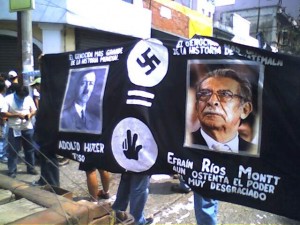HR COLUMN Impunity against the ropes in Latin America

Students denounce former Guatemalan dictator Ríos Montt as perpetrator of genocide at the San Carlos University in Guatemala City, 2006. Photo Firetreo; public domain.
The struggle to end impunity for state violence has been a central concern of the human rights movement in Latin America for decades. Efforts by victims, rights advocates, and justice officials to promote accountability have been determined, and in many instances heroic. The results have been mixed. Many human rights abusers who once seemed untouchable are behind bars, yet others continue to live entirely beyond the reach of the law.
The countries that have made the most progress in prosecuting past atrocities include Chile and Argentina. In Chile, more than three-quarters of the 3,186 documented killings and “disappearances” during the Augusto Pinochet dictatorship (1973-1990) have been heard by courts or are pending before the courts, and more than 800 former state security agents have been charged or convicted. In Argentina, more than 250 former military and police personnel have been convicted and sentenced for “dirty war” crimes—including the former de facto president, Jorge Videla (1976-1981)–and hundreds more are facing criminal prosecution.
Elsewhere in the region, progress on prosecuting past abuses has been more limited. In Peru, for example, former President Alberto Fujimori and his intelligence chief, Vladimiro Montesinos—as well as several former army generals and members of a government death squad—are serving lengthy prison sentences for killings and “disappearances” committed in the early 1990s. Yet there has been virtually no progress in prosecuting the many serious abuses against civilians under Fujimori’s predecessors.
Brazil has only just taken its first significant steps toward addressing grave abuses during the country’s military dictatorship (1964-1985). Last May, a national truth commission began investigating abuse cases from that era. And in August, a federal judge ordered the first trial of former state agents for their alleged roles in enforced disappearances in the 1970s.
For some countries in the region, the challenge is not merely confronting the past, as serious abuses continue to occur today. In Mexico, for example, security forces waging the country’s “war on drugs” have committed widespread human rights violations, including killings, disappearances, and torture. A major reason these abuses persist is because the soldiers who commit many of them are never investigated or prosecuted by civilian authorities. Instead their cases go to the military justice system, which has consistently proven unwilling or unable to prosecute them.
In August 2012, the Mexican Supreme Court ruled that the use of military jurisdiction to prosecute a human rights violation was unconstitutional. Nonetheless, the military has stated that it will continue to claim jurisdiction over cases of alleged abuses until the Military Code of Justice is revised, and efforts to reform the code have met with stiff resistance in Mexico’s Congress.
Military justice is also a problem in Colombia, the one country in the region still plagued by an internal armed conflict. For years, Colombian law held that military abuses should be tried in civilian courts. However, the administration of President Juan Manuel Santos recently won passage of a constitutional amendment that will allow the investigation and trial of military abuses by the military justice system. The amendment could lead to the transfer of past cases from civilian prosecutors to the military justice system.
Of particular concern are the hundreds—and possibly thousands—of cases from the past decade in which military personnel murdered civilians and reported them as combatants killed in action, apparently in response to pressure to boost body counts. Civilian prosecutors have opened investigations in more than 1,700 such cases (involving approximately 3,000 victims), but have obtained convictions in fewer than 10 percent of them. If the remaining cases wind up in military courts, it is very unlikely justice will be served.
Perhaps nowhere have the obstacles to accountability been more daunting than in Guatemala. According to the country’s truth commission, as many as 200,000 people were killed during the country’s internal armed conflict, most of them civilians killed by security forces, who carried out hundreds of massacres and acts of genocide. Yet only a handful of these cases have been successfully prosecuted—and these successes have come at a considerable cost. Prosecutors have been driven into exile; witnesses have been murdered.
Despite the risks, however, victims, rights advocates and justice officials have pressed forward. Last year, Efraín Ríos Montt—a retired general who led the military regime from 1982 to 1983 that carried out hundreds of massacres of unarmed civilians—was charged with genocide and crimes against humanity. The former general is under house arrest. The progress made in this case–and in the few others that have been prosecuted–has marked a dramatic break from the climate of absolute impunity that reigned in Guatemala for decades.
Daniel Wilkinson is the Managing Director for the Americas at Human Rights Watch.












